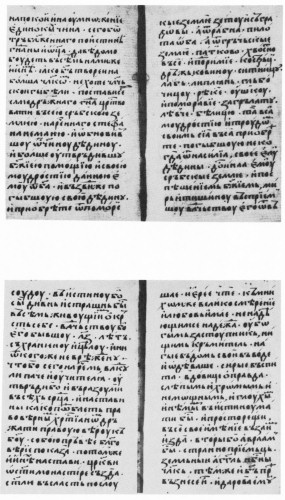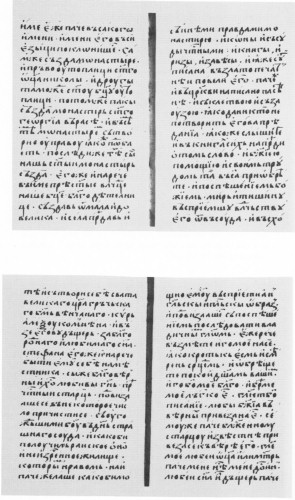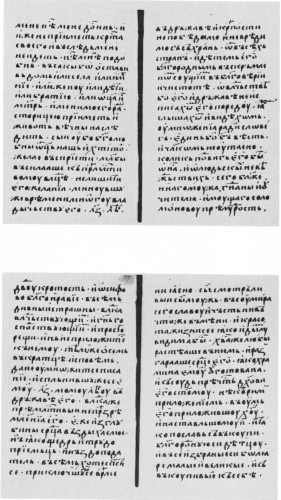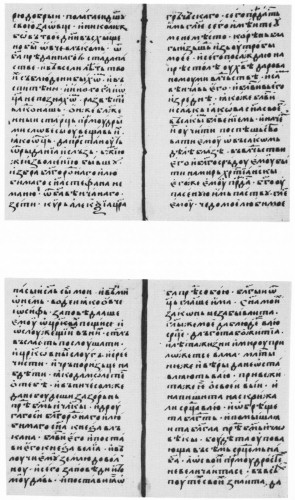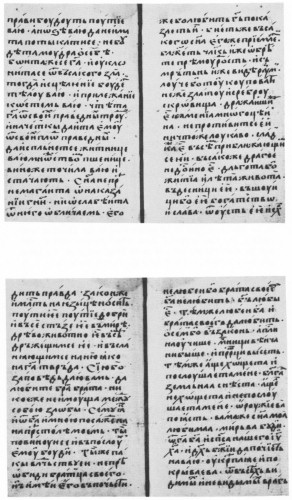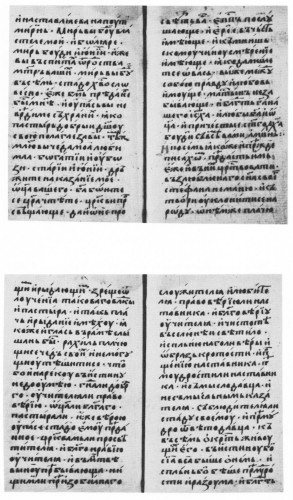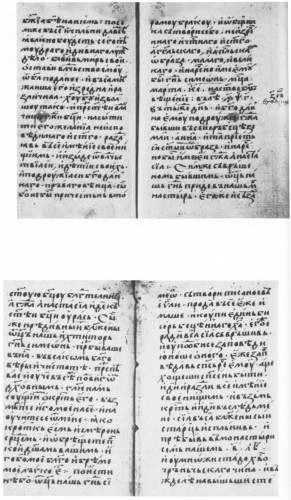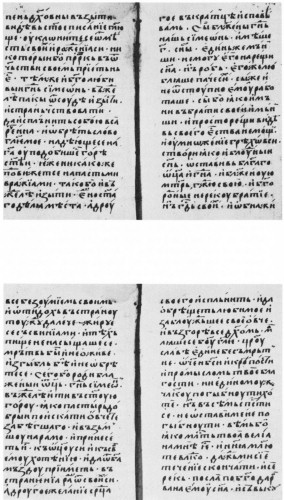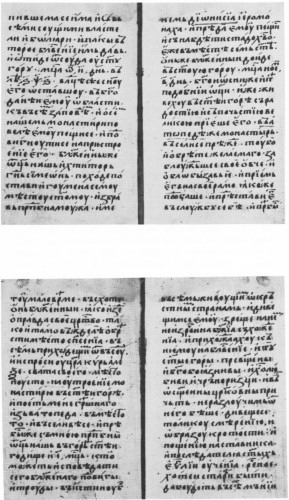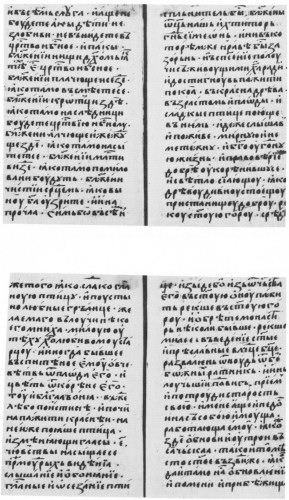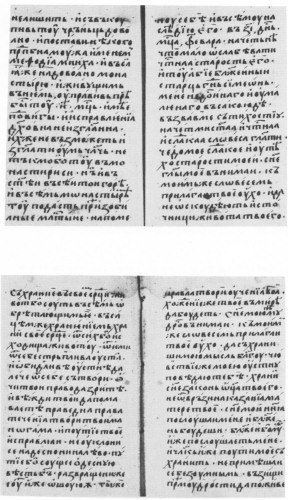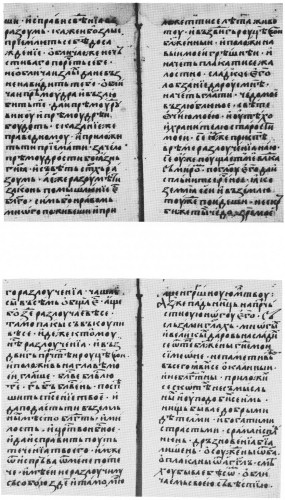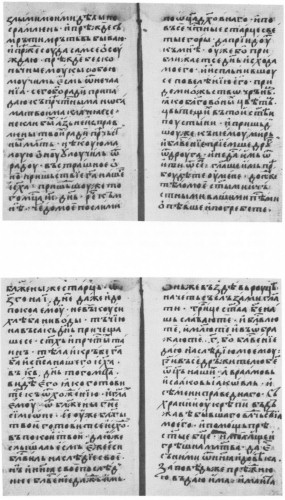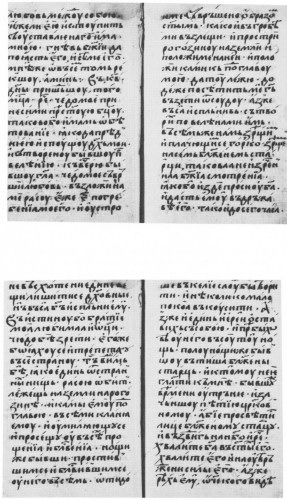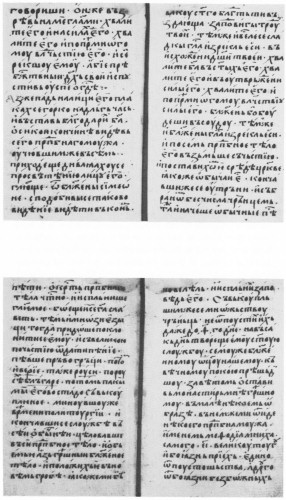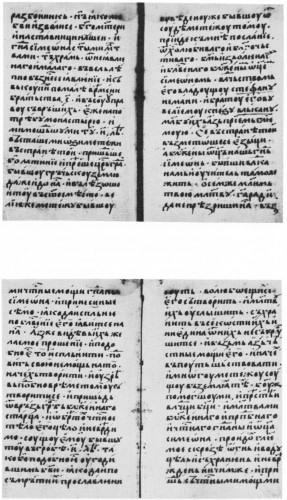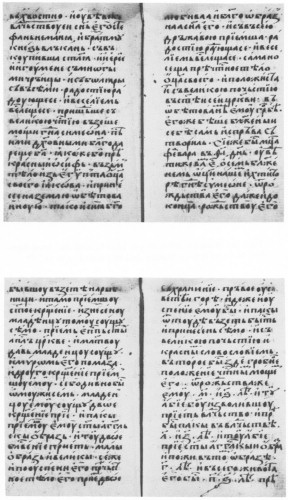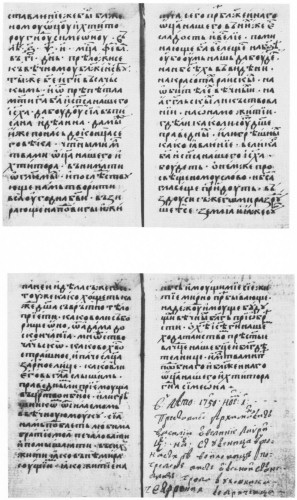THE LIFE OF STEPHEN NEMANJA (ST. SIMEON)
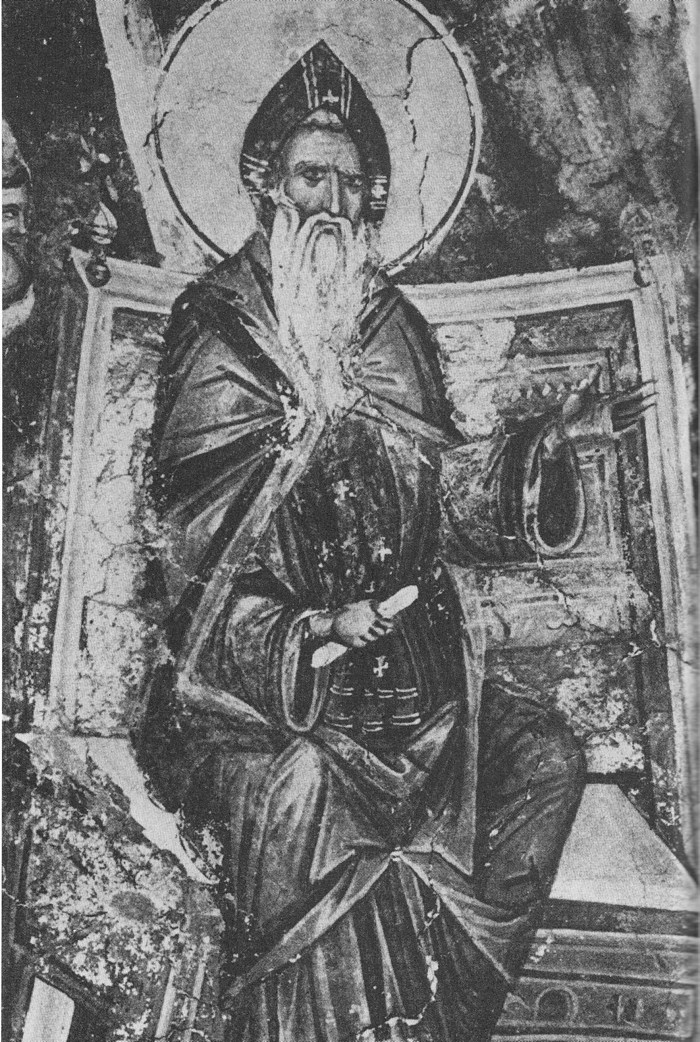
Stephen Nemanja (Peč Serbia 1345)
- __1_
- __2_
- __3_
- __4_
- __5_
- __6_
- __7_
- __8_
- __9_
- __10_
- __11_
- __12_
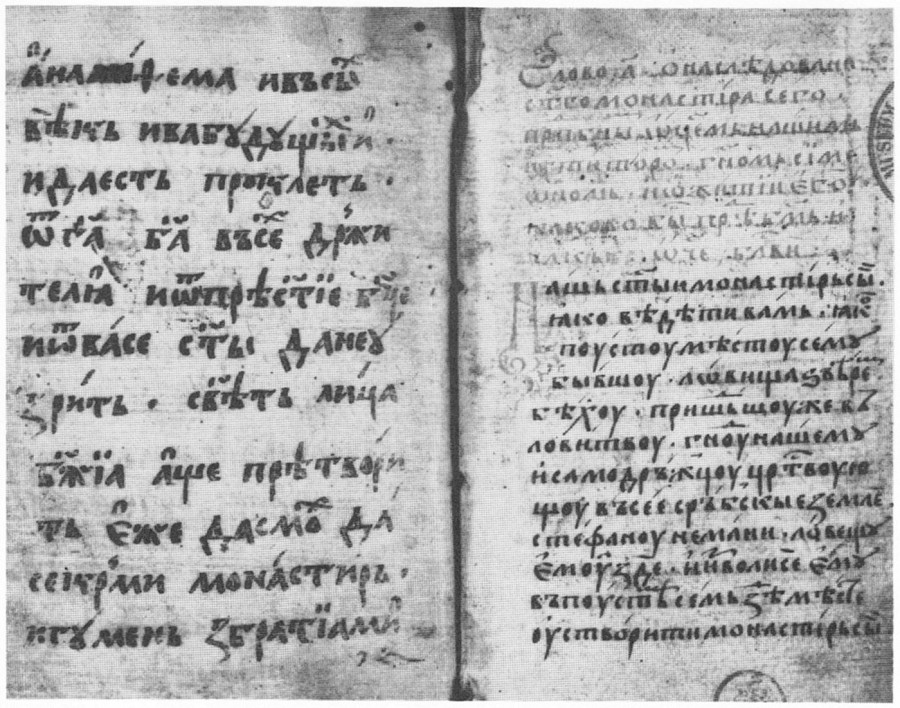
ON HOW OUR VENERABLE FATHER AND FOUNDER
Lord Simeon [1] Inherited This Holy Monastery, [2]
and On How His Life Was Before God and Man.
Bless us, Father!
This, our holy monastery, as you know, was once a hunting ground for wild animals, as it was a wilderness. And coming here for the chase, our lord and autocrat, and ruler of the whole Serbian land, [3] Stephen Nemanja [4] would hunt this ground. And he liked it here in this wilderness, and built this monastery
257
![]()
![]()
258
![]()
259
for the preservation and growth of a monastic order.
Now let it be known to all of us and to others, that God, guiding man to the better and wishing man not death, [5] established this: that our truly thrice-blessed lord and father called Stephen Nemanja be autocratic lord, to rule over the whole Serbian land. And after he had recovered his ancestral patrimony, and with God’s help and his God-given wisdom had fortified it even more and restored this patrimonial loss, [6] he acquired Zeta and its cities from the coastland; and from Rabno, both parts of Pilot, [7] and from the Greek lands, Patkovo and all of Hvostno and Podrimlje, Kostrac, Drškovina, Sitnica, Lab, Lipljan, Dubočica, Reke, Uška and Pomoravlje, Zagrlata, Levče and Belica. [8] He acquired it all by wisdom and work: all that had been taken by force from his patrimony, which was due him of the Serbian land. And with God’s aid, his dominion enjoyed peace and harmony on all sides.
For, verily, he was admired and feared by all who lived near him; and his dominion endured for thirty-seven years, [9] inviolate and unharmed by anyone.
Yea, what shall we call this man? Shall it be lord, or even more, teacher? For he fortified and edified the hearts of all, and taught us how Orthodox Christians should keep the true faith before God. First he revealed piety in himself, and then he taught others. He consecrated churches, built monasteries, listened to holy men with delight, respected priests and treated monks with great love and humility. He brought hope to the hopeless, defended the needy, and sustained the poor. He took the naked to his home and clothed them, he fed orphans, protected widows, and was truly like a mother to the blind and the lame, the infirm, the deaf and the dumb. Put simply, he lent out all his possessions, for he was a second Abraham, a hospitable man, an angel on earth, and a man from heaven: [10] “Wherefore God also hath exalted him, and given him a name which is above every name.” (Philippians 2:9) And before his name all nations shall bow. [11]
![]()
260
![]()
261
And he built monasteries himself, at first in Toplica in honor of Saint Nicholas, [12] and then a second one in honor of the Holy Mother of God. [13] Then he built another monastery in Ras in honor of Saint George. [14] And he established an order for all these monasteries as was fitting. And after these, he built our holy monastery, which he consecrated in the name of the Most Holy Lady, Our Benefactress, the Mother of God. [15] Having built it from start to finish, he granted this monastery villages along with other properties: icons and holy chalices, and books and vestments and tapestries. And what he granted was written in his gold-sealed charter as well as on the wall in the church, with a vow and assurance that no one would violate his donations. [16] And you shall hear about these words further on in these writings.
Thus with the help of God and by his own labors he accomplished all this. And after his dominion was at peace and in harmony with everyone through God’s help, he was moved by a desire to be related by marriage to the great Greek Emperor, crowned by God, His Majesty Alexius Comnenus. [17] And he obtained his daughter for his noble and beloved son Stephen, whom he designated his successor. [18] And this pious and Christ-loving lord, our venerable patriarch, strove to be counted on Judgment Day among those who please God. Thus he sought the way to gain that heavenly and ineffable dwelling, in the striving for which he desired even the more to receive the angelic and apostolic station. [19] And he strove zealously to follow the words of the Lord: (Matthew 11:29-30) “Take my yoke upon you, for I am meek and lowly in heart, and ye shall find rest unto your souls. For my yoke is easy and my burden is light.” For the Scriptures say: “The love for God is established in the faithful.” [20] And surely that which has been spoken refers even the more to the faith of this blessed patriarch: (Matthew 10:37-38; 19:29) “He that loveth father or mother more than me is not worthy of me; and he that loveth son or daughter more than me is not worthy of me. And he that taketh
![]()
262
![]()
263
not his cross, and followeth after me, is not worthy of me. And every one that hath forsaken house, or villages, or possessions, or wife, or children, or brethren, or father, or mother, for my name’s sake, shall receive an hundredfold, and shall inherit everlasting life.” [21] Thus he, our God-loving father and founder, desiring to gain this, addressed his supplication to the all-merciful Lord, that He not deprive him of his desire.
And though many years of his reign passed, to wit thirty-seven years, he was able to keep his dominion and forces undefeated and unharmed everywhere, and to rear his noble children in piety and purity. But we have written about his reign and dominion not in the order that we heard about it and witnessed it lest we be verbose. [22] For God alone knows, though it was not concealed from men, how great was his struggle on our behalf and against man’s ignorance, the struggle of this blessed man, our lord and teacher who possessed the wisdom of Solomon, the gentleness of David, and the righteousness of Joseph. Yea, he was admired and feared by all, being a ruler of rulers and a lord of lords. Put simply, no one could be likened to him. [23] Therefore I shall tell about this in brief lest this writing be verbose. [22]
And after the thirty-seventh year of his reign had passed, the all-merciful Lord, Receiver of labors and Giver of rewards to all who wish to be saved, scorned not his supplication which issued from the depths of his heart, and was compassionate. For clearly, when the time had come, this obedient man thought nought of the glory and honor of this world, and considered the beauty of this life as smoke. But love for Christ grew in him and ignited his heart, which was like a temple prepared for Him, and a vessel most pure for His Holy Spirit. And by some inclination Christ inclined his mind and instructed him.
And so he sent to gather his noble children and all his chosen boyars, both the high and low in rank. [24] And having gathered them to himself, he began to instruct them, saying:
![]()
264
![]()
265
“My beloved children whom I have reared! Behold, all of you know how in His wisdom God appointed me to rule over you, and how our land was ruined when first I acquired it. And all of your know how as long as I had strength with the help of God and Our Holy Lady, the Mother of God, I was neither indolent nor allowed myself rest until I set everything in order. And with God’s help I added to this land for you, both in length and breadth, as all of you know. And I have reared all of you as my own children, even to this day, and I have taught you how to keep the Orthodox faith. Many foreigners have risen against me and swarmed over me like a bee hive, yet I resisted them and overcame them. [25] Therefore, my beloved children, forget not your instruction and the Orthodox law, which I have established.
For he who keeps this will have God as his helper, and Our Holy Lady, the Mother of God, and my prayers, though they be sinful. Let me, your lord, now depart in peace, so that mine eyes may see the salvation which He has prepared before the face of the whole world as a revelation to all nations, [26] and to your glory as well, my flock. For I see how all that is of man is vanity, that nought remains after death; neither wealth remains nor is glory attained. For death comes and all this is lost. Thus our restlessness is in vain. Short is the path which we walk, and our life is but smoke, vapor, decay, and dust. It appeareth for a little time, and then quickly vanisheth away. Verily, all is vanity. (James 4:14) For life is but shadow and dream, and our restlessness over everything earthly is for nothing, as it is written: ‘When we gain the whole world, we then settle in our grave where together lie both king and knave.’ Therefore, my beloved children, release me forthwith, that I may go to see the Consolation of Israel.” [27]
And with these admonitions the good lord and gentle shepherd admonished them. And they all wept much and said: “Leave us not as orphans, O lord, for you have illumined us, and you have instructed us, and you have enlightened us, O gentle
![]()
266
![]()
267
shepherd, who lays down his soul for his sheep! For never during your days has the wolf carried off a lamb from the flock which God entrusted to you, O shepherd. [28] And throughout all your thirty-eight years [29] were we sheltered and nurtured, and we have known no other lord and father save you, O master.”
Now he, the venerable patriarch, with words most wise entreated them like a father to desist from weeping and tears, for it was God’s will. And he chose his noble and beloved son Stephen Nemanja, [30] the son-in-law of the Greek Emperor Alexius, who was crowned by God, and handed him over to them, saying: “Take him in my place: A good root who issued from my loins. I am setting him on the throne of the dominion granted me by Christ.”
And having crowned him himself and blessing him abundantly just as Isaac blessed his son Jacob with ample blessings, [31] he began to instruct him to concern himself with every good deed in his dominion, and to be kindhearted to the Christian community, the God-sheltered flock which he entrusted to him; and he said: “O my beloved child! Shepherd them, my Israel, give heed to them, and lead them like Joseph the lamb.”
He commanded him to look after the churches and those serving therein, to listen willingly to the prelates and church servants, to respect the priests, and to protect the monks, “so they may pray for you, and you will be ashamed of nought in the sight of God and man.”
Now he blessed his other noble and beloved son, Prince Vukan, appointed him Grand Župan, and turned over sufficient land to him. [32] And upon giving him the same commands, the good father placed them both before himself, and he said to them: [33] (Proverbs 3:1-18) “My sons, forget not my laws, but let your hearts preserve my words: For length of days, and long life, and peace shall they add to you. Let neither mercy nor faith forsake you; bind them about your neck and write them upon the table of your heart. So shall you find favor and good understanding in the sight of God and man. [34] Trust in the Lord with all your heart, and be not proud of your own understanding. Be mindful in all your ways that your way be the
![]()
268
![]()
269
right one, lest your feet stumble. Be not wise in your own eyes: Fear the Lord, and depart from all evil. Then it shall be health to your body and marrow to your bones. Honor the Lord with your righteous deeds, and give Him the first fruits of your righteous crops: So shall your bams be filled with abundant grain, and your presses shall burst forth with wine. My sons, despise not thou the chastening of the Lord: For whom the Lord loveth He chasteneth, and He scourges every son whom He receiveth. (Hebrews 12:5-8)
Happy is the man who finds wisdom, and the mortal who acquires understanding. For better to gain that than a treasure of gold and silver; it is dearer than a precious stone. Nothing evil withstands her, [35] and it is sweet for all who draw nigh unto her.
Every other valuable loses its worth, for length of days and long life is in her right hand, and in her left hand riches and honor. From her mouth issue justice and law, and on her tongue she bears mercy. Her ways are the ways of goodliness, and all her paths are peace. She is the Tree of Life to all who cleave to her and are guided by her as by the mighty Lord. [36] Thus I give you this command: Let brother love brother, and let there be no enmity between you. Submit yourself and be obedient to him who was placed upon my throne by me, just as by God. [37] And you who are to rule, insult not your brother, but show him respect. He that loveth not his brother loveth not God: God is love. [38] Thus, he that loves God, let him also love his brother. (I John 4:8) For this is the essence of the entire law: the Apostles taught this, the Martyrs were crowned for it, and the Prophets extolled it. [39] Therefore, if you are willing and obey me, you shall eat the bounty of the land; (Isaiah 1:19-20) but if you are unwilling and disobey me, you shall be devoured by the sword. [40] Peace be unto you, my beloved sons, from the Lord God and Our Saviour Jesus Christ, and may the spirit of God rest upon you, strengthen and protect you from all enemies visible and invisible, and guide you to the way of peace.
![]()
270
![]()
271
“And peace be unto you, my lords and boyars; peace also be unto the youth, you whom I have reared from the birth of your mothers. Peace be unto all of you, O flock of the spirit in Christ, you who were entrusted to me by God, you whom I preserved from harm, having tended you like a good shepherd who lays down his life for you. [41] Thus I implore you, my beloved children, rich and poor, young and old: Keep my, your father’s teachings: (1 Peter 2:17) Fear God, honor the Tsar, praise the churches so they may praise you, listen to the prelates, have respect for priests, and be humble toward monks so they may pray for you. May you who have justice and love among you not forget charity. (2 Corinthians 13:14) And the grace of the Lord Jesus Christ, and the love of God, and the communion of the Holy Ghost be with you all. Amen.”
After this, as we have already written, he handed over to them his beloved son Stephen Nemanja to rule among them, and he made the people retire. But they cried and wept seeing they were parting with such a master and shepherd; and there was crying and weeping such as once was heard in Rama when Rachel wept for her children and would not be comforted. [42] For what shall I call him? Yea, I know not! [43] A good lord? A teacher of Orthodoxy? A good father? A shepherd who through faith tended the flock entrusted to him? An enlightener of churches, a teacher of morality, and a man of unceasing prayer? The most diligent of servants and lover of the poor? A preceptor of Orthodoxy, teacher of piety, and luminary of universal purity? One of the truly faithful, a paragon of forbearance, and preceptor of abstinence? A preceptor of wisdom, and counselor and teacher of the thoughtless? A protector of his flock and the wisest of oracles to all who lived near him? [44] (Luke 2,40) Yea, he was all of these, for he was filled with wisdom and understanding, and the grace of God was upon him. [45]
![]()
272
![]()
273
And after he accomplished all these things—so that the work of this most wise and wonderful of men should be revealed to all—and blessed his community, he left the dominion given to him by God and his special and sundry accumulations, for it was the will of Christ the Lord and the Most Holy Lady, the Mother of God, to fill him with an unutterable and sacred desire. He gave all his possessions to the poor, took leave of his dominion, his children and his God-given wife of the first marriage (for he did not marry twice [46]) and joined himself to that ineffable and honorable, holy angelic and apostolic station of the upper and lower form. [47] And he was given the name Simeon on the twenty-fifth day of the month of March, on the Feast of the Annunciation, in the year 6703. [48] On that same day his God-given wife Anna, the former lady of the the entire Serbian land, also assumed this holy station. And she was given the name Anastasia.
After this was accomplished, our father and lord came to our monastery [49] of the Holy Mother of God, Our Benefactress, which he had built; and our Lady Anastasia went to the Holy Mother of God Convent in Ras. [50] And Lord Simeon, our truly wonderful and blessed father and founder, abided among us in piety and purity, helping and teaching all by his spiritual struggle, and saying to us who were near him: (Matthew 11:29-30) “Take my yoke upon you, and learn of me; for I am meek and lowly in heart: and ye shall find rest unto your souls. For my yoke is easy and my burden light.”
Verily, our father Lord Simeon did as was written in the Gospel: He sold all that he had and acquired the priceless pearl of Christ, [51] for whose sake he had done all this. And he was worthy of the command of that young man whom the Saviour commanded, saying: “If thou wilt be saved, go and give all thy possessions to the poor and take up the cross and follow me.” [52]
After this blessed patriarch had accomplished all these things and abided in this our monastery for two years, he increased Christ’s flock of monks and was moved by the desire to ascend to a higher plane of spiritual life, having reflected on
![]()
274
![]()
275
the words of the Holy Scriptures: “Turn away from your places and people, for no prophet is accepted in his own country.” [53] (Luke 4:24) Thus was God-loving Lord Simeon moved by a desire to leave this place and to journey forth, so that he might accomplish in himself all that had been spoken, having also found the saying: “Those who trust in the Lord are like unto the Holy Mountain that can in no wise be moved by the attacks of the Devil.” [54]
And so he was moved by a desire to leave, first because of the holy place; the second reason I will make known to you in brief.
He, our blessed Lord Simeon, had three sons. One of them, the youngest, whom he loved the most (I cannot call him a son, but rather a servant), toiled tirelessly for him. Put simply, as the least among his brothers and as the youngest, and being aware of the weakness of his nature and the multiplication of his sins, he acted like the Prodigal Son. Thus, having left his good father and lord, and his blessed mother and lady, and — I will not say brothers but rather his noble masters—he exposed them all through his thoughtlessness. And I [55] departed to a distant land, fed with swine, and could not be sated with their fodder: “He was dead and would not be revived, he was lost and would not be found.” [56]
Thence was the blessed father Lord Simeon moved by a desire to go to the Holy Mountain [57] to search for his stray lamb like a good shepherd and, upon laying it on his shoulder, to bring it home to its father and its hope. Then would he receive his reward from God for leaving his people, and accomplish the other desire of his heart —to find his beloved lost lamb. [58] And with his heart enkindled he prayed to God, saying: “O King of glory, Eternal One, Father of heaven and might, Who by Thy good providence desires for man not death but salvation, [59] leave me not to perish. (1 Timothy 2:4) For I know how great is Thy mercy toward me. And now, O Lord, I beseech Thee, let me live out my days.”
And when he had said this, he sent for his God-given sons.
![]()
276
![]()
277
After meeting with them and with all the lords and boyars, and giving them his blessing for a second time, he set off from here for the Holy Mountain in the month of October, on the eighth day, in the year 6706. [60] And he ordered the lord his son, who remained in his God-given domain, to carry out all his commands, as well as to look after our monastery and see to its completion. And in leaving, our blessed father and founder Lord Simeon appointed a hegumen for this holy place. He chose a venerable man in the person of the monk Dionysius, and charged him with looking after and protecting Christ’s flock in this holy place.
And he, the blessed one, came to the Holy Mountain [61] in the month of November, on the second day. [62] And the divinely inspired venerable fathers residing on the Holy Mountain received him with reverence and great joy. But he had rejoiced previously at the Vatopedi Monastery, for there he had found his desire, his lost lamb. [63] He kissed him, took him upon his shoulders, as was fitting, and placed him in his service.
After spending a short time here, [64] he, the blessed one, was seized by longing. And just as he had justified his reign here, so too was he moved by a desire to acquire there [65] a place of salvation for all who would come from near and far. And he obtained from his in-law, the Emperor Alexius, [66] an open place for building a monastery on the Holy Mountain. [67] And he took me, sinner that I am, from Vatopedi to this place, and the two of us settled there. And our venerable father spent one year and five months with me on the Holy Mountain. [68]
Yea, who can proclaim the struggles and strife of this blessed one? [69] For verily all who lived in the neighboring lands marveled at him, perceiving the ineffable grace shown him by God, and they came to him to be blessed. And the reverend, God-fearing, Christ-loving monks of the Holy Mountain and the entire ordained clergy of the Church were inseparable from him. They marveled at his great humility, and at the model forbearance and abstinence of the preceptor and follower of the teachings of the Holy Gospels, to wit: [70] “If any man desire to be first, the same shall be last of all, and servant of all”; and,
![]()
278
![]()
279
“Except ye be as innocent children, ye shall not enter into the kingdom of heaven”; [71] and again: “Blessed are the poor in spirit: for theirs is the the kingdom of heaven. Blessed are they that mourn here, for ye shall be comforted there. Blessed are the meek here, for ye shall be the heirs to the kingdom of heaven there. [72] Blessed are they which do hunger and thirst here, for they shall be filled there. Blessed are the merciful here, for they shall obtain mercy there. Blessed are the pure in heart, for they shall see God.”
For all this did our blessed father and founder Lord Simeon accomplish, and in no wise was he ashamed; rather he gained salvation together with those who lived for the sake of Christ. Thus he acquired a pasture of peace with its beautiful, full- grown, fruit-laden trees and sweet-singing birds. There he listened and lived a peaceful, calm, and pious life, rooting himself well in Orthodoxy and shining brightly like a wondrous tree standing in a sheltered harbor, that is, the Holy Mountain. [73]
And amidst all this he found, like a sweet-singing bird and a solitude-loving dove, that particular, sought-after monk, the tender consolation of this Christ-loving patriarch, the lamb that was once nurtured by him, the branch of his fruit and blossom of his root. [74] Here also was a gentle fragrance, and it was indeed what he desired. And he rested in this beautiful pasture in which a bird sang with various voices, and he delighted in the five wise senses, in the sight, sound, smell, tone, and touch of the bird.
He had set out from his fatherland to this holy pasture, that is, to the Holy Mountain, and found the previous monastery, that is, Mileje, [75] in honor of the Presentation of the Holy, Glorious Lady, the Mother of God, destroyed completely by godless adversaries. And he undertook another, even greater task, and he troubled his old age, having taken me, though I was unwortthy, to serve him. And just as he renewed and put everything in order here, [76] so also did he erect this holy place [77] in order not to deprive us of renewal, commemoration, and a refuge. Now, upon gathering a sufficient number of monks,
![]()
280
![]()
281
he appointed a venerable man in the person of the monk Methodius. [78] And after all had been put in order for the monastery and those living therein, he abided there for eight months, performing tasks and great acts of penance, which the human mind cannot express. And not only here at this monastery, but also throughout the Holy Mountain and to all the monasteries there did he give copious alms, that he and all his heirs might be remembered.
On the seventeenth day of the month of February his venerable old age began to weigh in some measure upon him. [79] And the blessed patriarch Lord Simeon summoned me immediately, though I be unworthy and wholly base, and he began calmly to speak holy, worthy, and sweet words to me: “My dear child and consolation of my old age, my son, attend to my words; incline your ear to my sayings, and keep them in your heart, so the sources of your life will not run dry.
For they are life to all who find them. Preserve your heart with all diligence, for out of it are the issues of life. Put away from you a froward mouth, and keep perverse lips far from you. Let your eyes look rightly, and let your eyelids look straight. Bring your feet to the right path, and establish your ways. Turn not to the right hand nor to the left, [80] for God knows the ways on the right side, but those on the left are corrupt. See that your instruction be right, and let your journeyings be in peace. My son, attend to my wisdom, incline your ear to my sayings, and keep my good thoughts; I proclaim to you the feeling of my lips. My son, keep the law of your father, and forsake not the instruction of your mother. [81] My son, obey me now and you will be blessed. For blessed is the man who obeys me, and the person who keeps my ways. Mingle not with the foolish. Seek wisdom and live. [82] Convert learning
![]()
282
![]()
283
into understanding. For he that reproves the wicked brings to himself shame: and he that rebukes an impious man brings himself a blot. Reprove not the wicked, lest he hate you; rebuke a wise man, and he will love you. Give blame to a wise man, and he will be wiser yet; give instruction to a just man, and he will increase what he has received. The fear of the Lord is the beginning of wisdom, and the counsel of the holy is understanding, since to understand the law is right thinking. For by this merit your days shall be multiplied, and the years of your life shall be increased.” [83]
Lifting his hands, the blessed one placed them upon my sinful neck and began to weep sorrowfully, giving me his sweet kisses. And he began to speak: “My beloved child, light of my eyes, consolation and protector of my old age! Behold, the time of our parting is already at hand; behold, the Lord has already released me in peace according to His word, so that the word shall be fulfilled: ‘for dust thou art, and unto dust shalt thou return.’ And you, my child, be not grieved seeing my departure, for this fate is shared by all. For if we are parted here, then shall we be joined again there, where there is no further parting.”
Lifting his most reverent hands and placing them upon my head, he said: “I bless you with my blessings. [84] The blessed Lord God will hasten your salvation. And in place of the earthly, may He grant you grace and mercy and the kingdom of heaven. May He make straight the course of your way, the heading of which you took from me at the beginning, having with you always my constant, though sinful prayer.”
And I, falling down at his most worthy feet, said in tears: “I have found joy in your numerous and abundant gifts, my blessed Lord Simeon, but I have forgotten everything, being wretched and unregenerate. I have consorted with senseless beasts and have become like them. I have been poor in good deeds and rich in passions. I have been filled with shame and deprived of God’s trust. I have been condemned by God, mourned by Angels, ridiculed by the Devil, denounced by my conscience,
![]()
284
![]()
285
and shamed by my evil deeds. I am dead before death, condemned before judgment, and tormented by despair before eternal torment. Therefore I fall at your most worthy feet, prostrating myself: Perchance I, incorrigible as I am, might obtain a measure of forgiveness at the terrible coming of Our Lord Jesus Christ in answer to your most worthy prayers.”
And when the eighteenth day of the month had come, [85] he said to me: “My child, send for my spiritual father and all the venerable elders of the Holy Mountain. Let them come to me, for already the day of my departure is approaching.”
And when his command had been fulfilled, there came a multitude of monks like fragrant blossoms, blooming in this holy wilderness. And when they came to him, they received one from the other peace wishes and blessings; and he did not allow them to leave him, saying to them: “Stay by me until you have performed the funeral service over my body with your holy and venerable chants, and have buried it.”
And from the seventeenth day to his repose, the blessed patriarch partook not of bread or water, receiving daily only the Eucharist, the holy and most venerable Mysteries of the Body and Blood of Our Lord God and Saviour, Jesus Christ.
On the twenty-second [86] day of the month I saw that he was preparing for his departure, and I said to him: “O blessed Lord Simeon, behold, your blessed departure to your repose is already prepared. And though I have already heard how you blessed your heirs, give them now your final blessing.”
And he lifted his hands and began to speak with tears: “O Holy Trinity, Our God, I glorify Thee and bless Thee; I beseech Thee and call upon Thee, for I am giving a third blessing to my heirs. [87] O Lord Almighty, God of our fathers Abraham, Isaac, and Jacob, and of the seed of the righteous, protect them and strengthen the power of my former dominion. And let the help of the Most Holy Mother of God and my, albeit sinful prayer be with them now and forever. And I give both of them [88] my previous command: Let there be love between you!
![]()
286
![]()
287
Whoever of them departs from what I have set down for them, may the wrath of God devour him and his seed.” And to all this I said, “Amen.”
When the twenty-second day of the month had come, he said: “My child, bring me the icon of the Most Holy Mother of God, [89] for I vowed that I would give up the ghost before Her.” After this command was fulfilled and evening fell, he said: “My child, be so kind, put on me that monk’s habit intended for my burial, and prepare me exactly in the holy manner, just as I will lie in the grave. And spread a bast mat on the ground, and place me upon it. Put a stone beneath my head so that I may lie here until the Lord visits me to take me from here.” Then I fulfilled everything, and did as he commanded.
And while all of us watched, we wept bitterly, seeing God’s ineffable solicitude for this blessed patriarch. For just as he here called upon God and was aided in his dominion, so now in this hour he wished not to deprive himself of any spiritual possession, and God fulfilled all things for him. Yea, my beloved brethren and fathers, he was a wonder to behold: He whom all feared and who caused trembling everywhere [90] could now be seen as one of the foreigners, poor, wrapped in a monk’s habit, lying on the ground on a bast mat with a stone beneath his head, prostrating and humbling himself before all, and begging forgiveness of all.
And when night fell, having received his blessing, all took leave of him and repaired to their cells to pray and take some rest. But I and one priest whom I retained with me, we remained by him that entire night. By midnight the blessed patriarch grew quiet and left off speaking to me. When morning broke and they began chanting in the church, the blessed patriarch’s face at once became radiant, and he lifted up his eyes [91] to heaven and said: “Praise God in His sanctuary: Praise Him in the firmament of His power.” (Psalm 150:1) And I said to him: “Father, whom did you see when you spoke?” But he looked up at me
![]()
288
![]()
289
and said: “Praise Him for His mighty acts: Praise Him according to His excellent greatness.” And upon saying this, he immediately gave up his divine soul and reposed in the Lord.
And I fell upon his face and wept bitterly for a long time. Upon rising, I thanked God for having witnessed the death of this venerable man.
And when they all learned of this, they came and marveled at the radiance of his face, saying: “O blessed Simeon, you have made yourself worthy of such a vision —the Holy Lord has bestowed grace upon you for the struggles of your labors. Therefore did you speak in a sweet voice, rejoicing as you gave up the ghost: ‘Praise God in His sanctuary: Praise Him in the firmament of His power. Praise Him according to the excellent greatness of His might.’ [92] For everywhere shall you be blessed. Therefore did you also speak in a holy voice.”
Afterward we took his venerable body and placed it in the middle of the church, as is the custom. And after Matins were ended and a countless number of monks had gathered, they, began solemnly to chant the customary dirges over his venerable body. Thus was fulfilled what was spoken: “Ye that fear the Lord, praise Him.” And thereafter a multitude of of people came to pay him homage, and with great solemnity to perform the dirges. First the Greeks chanted, then the Iberians, and then the Russians; and after the Russians, the Bulgarians, [93] and then again did we, his assembled flock. And when some time had passed after the liturgy and all the customary services were ended, everyone kissed his venerable body. And I, sinner that I am, having enfolded his venerable body, I placed it in a new grave. As I was commanded, so did I fulfill his command. And until the ninth day I did not release the multitude of monks that had gathered, celebrating a holy service for him every day.
And when he, our blessed father, passed on to his eternal rest, by his will he bequeathed the monastery and those remaining few to me, sinner that I am. Accordingly, to my charge came a venerable man, the monk Methodius, fifteen in all. [94] I was in distress and much afraid, first, from sadness and, second, from fear of godless robbers. But it pleased the Mother of God, Our
![]()
290
![]()
291
Preceptress, to show Her love — and also through the holy prayers of Lord Simeon —and this house grew from its inconspicuous and humble beginnings into a magnificent establishment. And after a short time I assembled a brotherhood of two hundred, [95] and I arranged for all of the monastery’s needs.
Now, after being here for eight years, much turmoil broke out in that region, [96] for the Latins came and took the Imperial City which was formerly Greek land. [97] And they came even to us here, to this holy place, because there was great turmoil. And when news of this turmoil reached near and far, a message came to me from the Christ-loving, devout, and God-appointed Stephen Nemanja—who was blessed by the blessed father Simeon and whose dominion he ruled —and from his brother, the Grand Župan Vukan. I received their request which said: “Behold, the people have risen in that region, and our blessed father Simeon, our former lord and teacher, lies there. Therefore, we beseech you [98] that you not ignore us.
Take the venerable relics of our Lord Simeon and bring them here to us, so that his blessing shall be fulfilled upon us.” [99]
Upon considering their cherished request and the necessity of fulfilling it, and rousing my weakness to the task, I began to act. Finding an appropriate time, I went and opened the grave of the blessed patriarch and found his venerable body whole and intact, though he had been in the grave for eight years. For this is fitting for those who have pleased God, that even after death they are extolled; and He works the will of those who fear Him and hears their prayer: “He keepeth all their bones: not one of them is broken.” Taking his venerable relics, I set off on my way. And though there was much turmoil in those lands, with the help of God and the Most Holy Lady, the Mother of God, and the prayers of our blessed and venerable and worthy lord and father Simeon, I came, so to speak, through fire and water whole and intact and unharmed in any way.
And I arrived in Hvostno [100] with the venerable relics. And
![]()
292
![]()
293
when his son the ruler, Stephen Nemanja, and his brother, Prince Vukan, heard of this, they assembled dignitaries and priests and hegumens with many monks, and together with the boyars and all the others they rejoiced with joy, and made merry with merriment. [101] They came with great reverence, took the relics of Lord Simeon, and thanked God with spiritual hymns. For just as the good Joseph took the body of his father Jacob from Egypt and brought it to the Promised Land, [102] so also did these, his God-loving sons, together with the entire nation, receive him, rejoicing with joy and making merry with merriment, themselves bearing the venerable body of their father. And with great honor they placed him in this holy church, in a grave reserved for him, which the blessed one had prepared for himself at the beginning. And this came to pass in the month of February, on the nineteenth day. [103]
And you ought to learn about him, our blessed father and founder Lord Simeon, from his birth right up to his death. He was born in Zeta on the Ribnica, [104] and there he received holy baptism. When the child was brought hither, [105] the bishop of the Church of the Holy Apostles [106] received him. And upon giving the child his blessing, he anointed him with myrrh, and he received a second baptism. [107] For wondrous things came to pass with this man, receiving two baptisms as a child. And again, when he received the holy angelic station, here too he received two blessings, the upper and the lower form. [108] And thus, after his death, his venerable body received two burials: First at the Holy Mountain where he died and from whence he was taken and brought here; and with great honor and solemn glorification a second interment of his venerable relics took place. After forty-six years from his birth had passed, he received thereupon, by God’s will, his dominion. And he remained in his dominion for thirty-seven years, and then received the holy angelic station in which he spent three years, living in all eighty-six years. [109] And the blessed father and founder Lord Simeon
![]()
294
![]()
295
died in the year 6708, [110] in the month of February, on the thirteenth day, and passed on to eternal bliss.
And may Thou, O God and Lord of all, and Glorious Mother of the Lord God and Our Saviour Jesus Christ, make that which is written become deed. May we and those following us to the end of eternity, with the help of the venerable prayers of our father and founder, hearken to what is being said; and in emulation may we do all that is pleasing to God, being mindful of our venerable father’s struggles and life, in which there is delight and joy, mindlfulness of God, and rejoicing in God.
Thus, may our spirit contemplate the heavenly, the beauties of paradise, the eternal abodes, the angelic jubilation, and the life beyond; may it contemplate where and how the souls of the righteous and those of sinners abide, and how the mighty God and Our Saviour Jesus Christ will appear, the Enlightened One from Whom the word proceeds: (2 Peter 3:10) “The heavens shall pass away with a great noise, and the elements shall melt with fervent heat, and earth also and the works that are therein shall be burned up”; and how each soul will receive its mortal body; how that assembly of the multitude of mankind will be from Adam unto the end; how the face of Christ will appear, terrible and more brilliant than the sun; how His voice will be heard. Will He receive us as the righteous into the Kingdom of Heaven, or as sinners banish us to eternal torment? Therefore, my beloved brethren, it is fitting for us to be concerned in this life, and to think as those who are outside that world, as those who will have life in the heavens, passing through this life peacefully, fostering hope of acquiring the future eternal good in Christ Jesus Our Lord, through the intercession of Our Most Holy Lady and Benefactress, the Mother of God, and through the prayers of our venerable and blessed father and founder, Lord Simeon.
![]()
296
Notes to the Vita of Stephen Nemanja
1. Simeon is the monastic name of Stephen Nemanja, the Grand Župan of the Serbian State from ca. 1168-1195. On 25 March 1195, Simeon of his own accord abdicated to his son Stephen in order to withdraw to monastic life. The name Simeon was taken in honor of the “devout man in Jerusalem” mentioned in Luke 2:25: “And, behold, there was a man in Jerusalem, whose name was Simeon; and the same man was just and devout, waiting for the consolation of Israel: and the Holy Ghost was upon him.” See also note 18.
2. Stephen Nemanja’s greatest foundation was the Monastery of Studenica, which was built in the late eighties of early nineties of the twelfth century. It was his zadužbina, that is, his personal foundation, for the good of his soul, where he expected to be buried and commemorated in perpetuity (see A.P. Vlasto, op. cit., pp. 215-16). Hence, it was to this place that his relics were translated. Furthermore, Saint Sava was Heguman of Studenica from ca. 1205-1215; and this monastery was soon to become a principal, if not the preeminent institution in medieval Serbia. Today Studenica is located twenty kilometers from the town of Ušća.
3. By “whole Serbian land” is meant the medieval Serbian State which Nemanja succeeded in extending—as a result of successful military expeditions—from the Adriatic Sea to the outskirts of Sophia in present-day Bulgaria. See also note 6.
4. See note 1. Nemanja is the Serbian form of the biblical name Nehemiah. It is the first biblical name to be attested among Serbian overlords who traditionally bore old Slavic pagan names such as Časlav, Miroslav, Tihomir, and so on. The origins of the Nemanja family are obscure; and Stephen Nemanja has been considered, depending on the source, the son of Zavida, Uroš II, and Desa. He was born in Zeta (see note 7) in the town of Ribnica, near the modern-day city of Titograd in Montenegro. The date of his birth is also uncertain, though tradition places it in the year 1114.
5. The line, . . . that God, guiding man to the better and wishing man not death,” is a paraphrase of the opening lines to the Life of Constantine (see The Life of Constantine and The Life of Methodius).
6. The territory originally apportioned to Nemanja was the easternmost quarter of the Serbian princedom from Ras to Niš. The remaining three quarters were divided among his three brothers, Tihomir, Stražimir, and Miroslav. It seems however that none of the brothers was content with his portion and conflict ensued. In the end Nemanja defeated his brothers: Tihomir was killed, and Stražimir and Miroslav pledged their allegiance to him. Thus the tetrarchy ended and there emerged a unified Serbian State (see Historija naroda Jugoslavije, I [Belgrad, 1953]).
![]()
297
7. Zeta (or Dioclea until the end of the tenth century) is the old designation for an area which today makes up the greater part of Montenegro. The unnamed cities on the coastland are Budva, Kotor, Skadar, and Ulcinj. Rabno is modern-day Albania. The two parts of Pilot are Upper and Lower Pilot, an area located between the cities Prizren and Skadar.
8. The present-day corresponding place names are: Patkovo, an area around Đakovica; Hvostno is Metohija near Peć; Podrimle, an area around Prizren; Kostrac, an area near Pec; Drškovina, an area near Peć; Sitnica, Lab, and Lipljan are all in the Losov region around the rivers Sitnica and Lab, and the town of Lipljan; Dubočica, an area around Leskovac; Reke, an area around Aleksinac, Uška, an area between Nišava and Vlastina; Pomoravlje is the Južna Morava valley; Zagrlata, an area around Đunis near Krusevac; Levče and Belica are Levać and Temnić near the Morava River (see Stara Srpska Književnosti, [Novi Sad-Belgrad, 1966], p. 415).
9. According to tradition Nemanja ruled for thirty-seven years. However, it was he who brought about the independence of the Serbian State and inaugurated the two centuries of its greatness.
The notion of causing “fear” or “trembling” on all sides is a typical hyperbole of the panegyric style of writing. This notion is repeated again in Chapter IX.
10. The metaphoric allusion to Abraham’s hospitality originated in Genesis 18:19. Often this metaphor is used to encourage tire faithful and persuade them to exercise hospitality. For example, compare Paul’s use of it in Hebrews 13:2. This metaphor can, as it does here, also serve to emphasize the hero’s ascetic life style. Moreover, the motif of Abraham’s hospitality appears in apocryphal literature; cf. The Legend of Abraham, which is preserved in Serbian manuscripts beginning with the fourteenth century, though translated earlier (see Stare Srpske Biografije [Belgrad, 1968], p. 267).
It is curious to note that Sava’s phrase “an angel on earth and a man from heaven” is also found in the Narrative and Passion and Encomium of the Holy Martyrs Boris and Gleb.
11. If taken out of context this passage could be considered blasphemy for the obvious reason that it should only refer to the Lord. Of course this is not the case here. Such a passage is not uncommon in Serbian vitae, where it is used as a literary cliche and is a stereotyped phrase characterizing the pious ruler.
12. The Saint Nicholas Monastery was built sometime between 1165—1170, and became the seat of the bishopric of Toplica. The monastery was located near Kuršumlija and survived for over five hundred years. Today only its ruins remain (see V. Petković, Pregled crkvenih spomenika kroz povesnicu srpskog naroda [Belgrad, 1950], p. 214).
13. The Convent of the Holy Mother of God was built at approximately the same time as the Saint Nicholas Monastery, and was located in the same general area. It also survived for a long time, about five hundred years. Now only some ruins remain (see V. Petković, p. 33).
14. Saint George Monastery was built in the 1180’s just northwest of Ras
![]()
298
near the present-day city of Novi Pazar, Architecturally, the style of the church at the monastery—and the churches at the monastery and convent mentioned in notes 12 and 13—was a blend of East and West, that is, it incorporated both Byzantine and Dalmatian features (see G. Millet, ed., L’Art byzantin chez les Slaves, I [Paris, 1930]). The ruins of this structure are today known as George’s Columns (purdevi stubovi).
15. See note 2. The Church of the Mother of God is a part of the monastery of Studenica.
16. This inscription has not come down to us.
17. Alexius III (Angelus) was the Emperor of the Byzantine Empire (1195—1203). He chose to call himself Comnenus because Angelus, in his view, was not a name sufficiently eminent for him.
18. Stephen was the second of Nemanja’s three sons (the eldest was Vukan [Vlkan], the youngest, Rastko [Sava]). He was married in the early 1190’s to Evdokia, the youngest daughter of Alexius III. For reasons connected with the complex political struggle between East (Byzantium) and West (Rome) for ecclesiastic allegiance, Stephen soon repudiated his Greek wife (ca. 1202-1205) and married a Venetian. He pursued a pro-Roman policy, which culminated in his coronation by a papal legate in 1217 as King of Serbia, despite the disapproval of his younger brother and the Serbian Orthodox clergy. As a result he is known as Stephen the First-Crowned (Steven prvovenčani).
19. To receive the “angelic and apostolic station” meant to become a monk. Since it is common for a monk to strive to attain a high degree of spirituality, early Christian literature often compared monastic life to the angelic way oflife. The reference to “apostolic” undoubtedly refers to the Apostles who like monks strove to achieve incorporeity. Monkhood had two degrees, the lower and upper forms or schema. Full monkhood was achieved only in the upper form. The lower form was merely vows. See Stare Srpske Biografije, p. 267.
20. This is not a quotation from the Scriptures. However, the passage paraphrases the essence of I John 4:12: “No man hath seen God at any time. If we love one another, God dwelleth in us, and His love is perfected in us.”
21. The passage which is taken from Matthew 19:29 is not a verbatim quotation.
22. It may actually be that Sava is concerned that the Life he is writing might occupy too much of the Typicon’s limited space. More likely, however, this statement is nothing more than a “brevitas” formula, a favorite medieval rhetorical device.
23. This is another common literary cliche, much like the one mentioned in note 11.
24. Whereas the term boljare (boyars) is rarely met in Old Serbian literary monuments, it is frequently found in Old Bulgarian and Old Russian ones.
By the end of the twelfth century two classes of nobility began to emerge in Serbia: the upper, who were the great lords (velьmozь or
![]()
299
velьmužь) and the lesser, who were the military men (voinъ or voinikъ).
25. Perhaps this passage alludes to Psalm 118:12, where a similar image is found: “They compassed me about like bees; they are quenched as the fire of thorns; for in the name of the Lord I will destroy them.”
26. This passage is a paraphrase of Luke 2:29-31: “Lord, now lettest thou thy servant depart in peace, according to thy word: For mine eyes have seen thy salvation, which thou hast prepared before the face of all people;” ...
27. See note 1; here Sava likens Simeon to his namesake in Luke 2:25.
28. Compare this passage with the words of Jesus in John 10:11-17.
29. The number of years of Stephen Nemanja’s rule before abdicating and withdrawing to monastic life is more likely twenty-seven, and the manuscript should probably read: “And throughout all your twenty- eight years ...” Such an error could have resulted from the confusion of a letter’s numerical value.
30. That is Stephen the First-Crowned. See note 18.
31. Compare Genesis 27 and 28.
32. The lands which Vukan administered were the coastal provinces, that is, the region of Zeta (see note 7). Since Zeta had formerly been a kingdom, Vukan now had it restored with the aid of Pope Innocent III (1198—1216),and assumed the title of its former royal rulers, viz., Rex Dalmetiae et Diocliae. He then allied himself with Emmerich, King of Hungary (1196—1204), and conquered Serbia. With the aid of the Bulgarians, Stephen soon re-established himself and Vukan was forced to submit. However, the brothers were reconciled by Sava, who returned to Serbia from Mount Athos in 1207.
33. It is interesting to note that the thought behind Simeon’s address to his sons mirrors the Book of Proverbs, specifically Chapter 3.
34. In the original the last sentence reads: i obrěšteta blagodětь i pomyšljaita blagaa prědъ bogomъ i člověky. My translation follows Proverbs 3:4 verbatim. In this rendition the finite verb pomysljaita is changed into a noun modified by the plural adjective blagaa, which in the Slavic lacks a noun. If translated verbatim, the Slavic would read: “So shall ye find favor and think ye good before God and man.”
35. Beginning with this sentence there is a personification of mudrostь (wisdom), which in the Slavic is a noun of the feminine gender.
36. The passages from Proverbs 3:1 -18 are not entirely verbatim.
37. These words refer to Stephen and are, of course, addressed to Vukan.
38. To this quotation from I John 4:8 the Slavic had added “his brother,” which takes in the sense of I John 4:20: “. .. for he that loveth not his brother whom he hath seen, how can he love God whom he hath not seen”; and I John 4:21: “.. . That he who loveth God love his brother also.”
39. Cf. the words of Jesus in Matthew 22:37-40. The Slavic passage is somewhat elliptic and simply reads: apostoli naoučiše, moučenici věnčani byše i proroci vysetь” (verbatim: The Apostles taught, the Martyrs were crowned, and the Prophets extolled).
40. The wording of this passage from Isaiah 1:19-20 is changed somewhat in the Slavic.
![]()
300
41. This passage alludes to the words of Christ in John 10:15: “As the Father knoweth me, even so know I the Father: and I lay down my life for the sheep.”
42. The allusion in this passage is to Matthew 2:18: “In Rama was there a voice heard, lamentation and weeping and a great mourning, Rachel weeping for her children, and would not be comforted, because they were not.” Cf. also Jeremiah 31:15.
43. Rhetorical questions are a common feature in medieval literature in general and in the panegyric style of writing in particular.
44. The “piling up” of attributes is a stylistic device that is frequently found in the panegyric style of writing.
45. This passage quotes only the last line from Luke 2:40. The entire biblical passage reads: “And the child grew, and waxed strong in spirit, filled with wisdom: and the grace of God was upon him.”
46. It seems that in this passage Sava is alluding unapprovingly to the divorce and remarriage of his brother Stephen.
47. See note 19.
48. That is, 1195. See note 45, First OCS Life. The author is using the Byzantine calendar which is used in all Old Serbian manuscripts.
There is some question as to the accuracy of the year given by Sava when his father, Stephen Nemanja, became a monk. A contradiction arises upon closer consideration of the other dates given by him. If the year of Nemanja’s death is 1200—about which there is no doubt—and he spent three years as a monk, then the year he became a monk would have to be 1197.
49. The monastery is Studenica; see note 2.
50. That is, the Convent of the Holy Mother of God near Kuršumlija; see note 13.
51. The image of the pearl is found in Matthew 13:45-46: “Again, the kingdom of heaven is like unto a merchant man, seeking goodly pearls: Who, when he had found one pearl of great price, went and sold all that he had, and bought it.”
52. The reference to the young man alludes to Matthew 19:20-21: “The young man saith unto him. All these things have I kept from my youth up: What lack I yet? Jesus said unto him, If thou wilt be perfect, go and sell that thou hast, and give to the poor, and thou shalt have treasure in heaven: and come and follow me.” Cf. also Jesus’ words to his disciples in Matthew 16:24.
53. The only part of this quotation that is from the Scriptures are the words from Luke 4:24: “...No prophet is accepted in his own country.”
54. This quotation is from a Church song entitled The Holy Mountain. The “Mountain” referred to in the song is Mount Sinai upon which, according to Exodus 19, the Lord descended.
55. In this passage Sava speaks about himself now in the third person, now in the first.
56. Compare the Parable of the Prodigal Son, Luke 15:11-32.
57. That is, Mount Athos, which in Greek is known as Hagion Oros (The Holy Mountain). It is located in northeastern Greece and has
![]()
301
been the seat of a number of monasteries since the Middle Ages.
58. This passage repeats the image found in Luke 15:5: “And when he hath found it [the stray sheep, cf. Luke 15:4], he layeth it on his shoulders rejoicing.”
59. The quotation is only a part of I Timothy 2:4, which reads: “Who will have all men to be saved, and to come unto the knowledge of the truth.”
60. That is, 1197.
61. See note 57.
62. The fact that no year is given here has led some researchers to conclude that originally only the day and month was mentioned, a convention which is attested in numerous other manuscripts. Indicating the year is believed to be a later addition (see S .Hafner, Serbisches Mittelalter, [Graz, 1962], 140-41).
63. Vatopedi was one of the Greek monasteries on Mount Athos. Rastko first went to the Russian Monastery of Saint Panteleimon and there was tonsured and took the name Sava. Afterward he moved to the Vatopedi Monastery, where he lived until the arrival of his father.
64. According to R. Novakovic (see S. Hafner, p. 141), father and son were in Vatopedi from 2 November 1197 until September 1198.
65. This passage is somewhat elliptic because the specific referent of “here” and “there” is no longer as obvious as it was at one time. “Here” refers to Serbia, i.e., one could add “in this land”; “there” refers to the Holy Mountain, i.e., “on the Holy Mountain” could be added. All further references in this text to “here” and “there” in this context have the same meaning.
66. See note 17.
67. The monastery built on that “spot” was the Serbian Monastery Hilander.
68. The period of the year and five months would be from September 1198 until his death on 13 February 1200.
69. Hyperoche is yet another stylistic feature of the panegyric style of writing.
70. The phraseology, depiction, and notion of “God’s ineffable condescension” toward the hero is typical of the panegyric style of writing.
71. This passage is a paraphrase of Matthew 18:3: “And said, Verily I say unto you, Except ye be converted, and become as little children, ye shall not enter into the kingdom of heaven.”
72. Only the first part of this passage follows Matthew 5:4. The remainder of it seems to paraphrase a portion of the Sermon on the Mount, Matthew 5:5: “Blessed are they that mourn: for they shall be comforted. Blessed are the meek: for they shall inherit the earth.”
The adverbs “here” and “there” in this passage and the succeeding ones from Matthew 5 are Slavic emendations. Note that the quotation from Matthew 5:6 omits the words “after righteousness.”
73. Trees, fruit, and birds are fixed images in medieval Byzantine and Latin descriptions of an ideal landscape. Here the description functions as an allegory for monastic life (see S. Hafner, p. 141).
74. That is, his son Rastko (Sava).
![]()
302
75. Mileje (Mileon) is the Greek name of the place on which stood the Greek Monastery of Chilandari. According to tradition, it was built in the second half of the eleventh century and named after its founder Chelandarios. It was destroyed by brigands at the end of the twelfth century.
76. See note 65. For the sake of clarity I have omitted the adverb “there.”
77. The “spot” which Emperor Alexius III gave Simeon and Sava for building a monastery was the ruins of the former Greek monastery Chilandari (see note 75). This monastery was rebuilt by father and son (circa 1199) and named Hilandar (Chilandar) after the original monastery. It soon became the most important Serbian literary center, a position it retained until the fourteenth century. Even today Hilandar retains its importance and is a focal point of Serbian spirituality.
78. Apparently Simeon appointed the monk Methodius as hegumen of the monastery.
79. In Slavic this sentence in Šafařik’s text reads: vь -h- dьnь měseca fevrara načetь něčto malo oslaběvati čьstnaa starostь ego, which translates literally as “On the seventh day of the month of February his venerable old age began to weaken a little.”
80. The greater part of this address is taken from Proverbs 4:20-27: “My son, attend to my words; incline thine ear unto my sayings. Let them not depart from thine eyes; keep them in the midst of thine heart. For they are life unto those that find them and health to all their flesh. Keep thy heart with all diligence; for out of it are the issues of life. Put away from thee a forward mouth, and perverse lips put far from thee. Let thine eyes look right on, and let thine eyelids look straight before thee. Ponder the path of thy feet, and let all thy ways be established. Turn not to the right hand nor to the left: remove thy foot from evil.”
81. There is a curious reversal in this quotation from Proverbs 1-8: “My son, hear the instruction of thy father, and forsake not the law of thy mother.”
82. This passage paraphrases the essence of Proverbs 9:6: “Forsake the foolish and live; and go in the way of understanding.”
83. The quotations from Proverbs 9:7-11 are not entirely verbatim.
84. The original Slavic simply reads: blagoslove blagoslovlju te (verbatim: blessing I bless thee).
85. That is, February 1200.
86. In other manuscripts this date is given as the 22nd. The date given in this text (the 12th) represents a correction made by Šafařik.
87. It is questionable whether this number of occurences can be taken literally given the mystical significance of the numeral 3, and the fact that “trebling” is a literary cliche in works of this type.
88. That is, his sons Stephen and Vukan.
89. For the sake of clarity I have added the words “the icon of.” The Slavic reads: prenesi me prěsvetouju bogorodicou (verbatim: Bring me the Most Holy Mother of God).
90. See note 9.
![]()
303
91. The words “his eyes” have been added on the basis of the context. The original simply reads: i vьzdvigь na nebo i reče (verbatim: And he lifted up to the heavens and said).
92. This quotation is a mixture of Psalm 150:1-2, , which is quoted verbatim in the text.
93. The Iberians are the modern-day Georgians, whose monastery on Mount Athos, Iveron, was founded in the year 980. The Russian monks were from the Panteleimon Monastery, while the Bulgarian monks were probably from the Zographos Monastery.
94. It has been pointed out that Simeon’s bequest appears in the Hilander Typicon, where it is stated that Methodius was the first hegumen of the monastery and the number of remaining monks was ten (see S. Hafner, p. 144).
There is an interpretation of this passage by L. Mirković which has it that Methodius left the monastery with fourteen monks (see Stare Srpske Biografije, p. 269).
95. In another variant of the manuscript the size of the brotherhood is given as ninety, which is a more likely count. This discrepancy is due to the differing numerical values of the letters č = 90 and s = 200 (see Stare Srpske Biografije, p. 269).
96. The region referred to is that of Mount Athos.
97. The Imperial City—the traditional Slavic name for Constantinople—was taken by the Latins during the Fourth Crusade (1202—1204). The alleged purpose of this Crusade-initiated by Pope Innocent III — was to drive the Moslems from the Holy Land. However, its leaders, primarily Enrico, the Doge of Venice, and Baldwin, Count of Flanders, abandoned their purported objective and instead attacked the Dalmatian city of Zara—a leading rival of Venice in the maritime trade—and sacked it (1202). Though the Crusaders were at first excommunicated en masse by the Pope for perpetrating such a crime against Christians, they were subsequently pardoned. And now the Crusaders marched on Constantinople, which they seized and pillaged in 1204. This brought about the so-called Latin reign in Constantinople which lasted until 1261.
98. In Slavic this passage reads: o sem molimь tvoju molitvou, which translates literally as “Thus, we pray thy prayer.”
99. There was a good reason for Stephen and Vukan to be concerned about the safety of Simeon’s grave on Mount Athos. After the fall of Thessalonica(1205), the entire region remained in a state of turmoil for some thirty years owing to the alternate succession of Frankish, Greek, and Bulgarian suzerainties.
100. See note 8.
101. Tautologies of this type are another common device found in the panegyric style of writing.
102. Compare the story of Joseph in Genesis 50.
103. Though the year of this event is not given, from all indications it is not unreasonable to assume that it took place sometime between 1207-1208.
104. See notes 4 and 7; the Ribnica is, of course, the river.
![]()
304
105. That is, to Ras, near the present-day city of Novi Pazar.
106. The church in question is the Orthodox Church of Saints Peter and Paul in Ras.
107. Supposedly Stephen Nemanja was first baptized according to the Latin rite in Zeta—which had been attached to Rome—by a Catholic priest. He was baptized a second time according to the Orthodox rite (note anointment) in the Church of Saints Peter and Paul by the Bishop of Ras, Leontios. The date of his second Baptism is given as 1142—1144, a period which would make his age at the time approximately thirty—if the traditional date of his birth (1114) is accepted—and hardly a child as Sava states in the Life. However, it is possible to assume that Nemanja accepted Orthodox Baptism at approximately thirty years of age (whatever the date), because of his political ambitions in an area of strong Orthodox temper.
108. See note 19.
109. There is a great deal of disagreement and ongoing polemics among historians on the accuracy not only of these dates but virtually of all the dates given by Sava in this Life. For further discussion, see: V. Corović, “Pitanje o hronologiji u delima sv Save,” Godišnjica Nikole Čupiča, XLIX (1940); S. Novaković, “Kad se rodio i kad je počeo da vlada Steven Nemanja?” Istoriski Glasnik, 3/4 (1958); and P. Popović, “O hronologiji u delima sv. Save,” Glas Srpske Akademiie Nauke, CXII (1924).
110. That is, 1200, the only date which is certain among all the dates given in this work.
